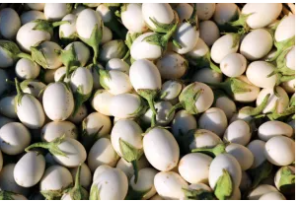
When we picture an eggplant, we picture a long, purple fruit – eggplant is a fruit even though it is often eaten in a savory way – not like these!
Eggplant can make for a great dish as an additional element or on their own! They can be grilled, cooked with tomato sauce and cheese, or added to any casserole. But, have you ever thought about the odd name for the fruit? The traditional eggplant looks nothing like an egg. However, this viral photo from Reddit has made this name make far more sense!
Now that we can see that eggplants really look like their name before becoming what we know and love, let’s find out about the differences between the white and purple eggplants. White eggplants, also known as white aubergines, are a variety of eggplant that have a creamy white color, as opposed to the more common deep purple color. While the eggplants in the picture might make us think that all white eggplants are small, they can also grow longer. Similarly, purple eggplants can sometimes be small and round.

Fresh organic white eggplant vegetable
When considering taste, all eggplant can be a bit bitter and tough when raw. The chewy fruit almost feels like a sponge if it is not cooked first. When cooked, it is a great food to take on the flavors of whatever it is combined with. They can be grilled, roasted, sautéed, fried, or baked, and are particularly well-suited to dishes that feature light sauces or delicate flavors. If overcooked, it can become too mushy to be enjoyable.
For white eggplant, Specialty Produce describes the flavor as “fruity and mild” and cooked white eggplant as “warm” and “mellow”. The thicker skin on a white eggplant, it is recommended to peel the thick skin off before cooking or eating. Purple eggplant has thinner skin and therefore can be eaten. White eggplants are not as widely available as traditional eggplants, but they can often be found in specialty markets or through online seed catalogs for home gardeners.
First mentioned in 544 in a Chinese book on agriculture, eggplants have long been a mysteriously named fruit. And as the story goes, it was European farmers in the 1700’s who gave the fruit their name. As they resembled small white or yellow eggs at the time, the farmers were reminded of goose or duck eggs and therefore gave them their title.
Did you know eggplants could look like this? Let us know in the comments!